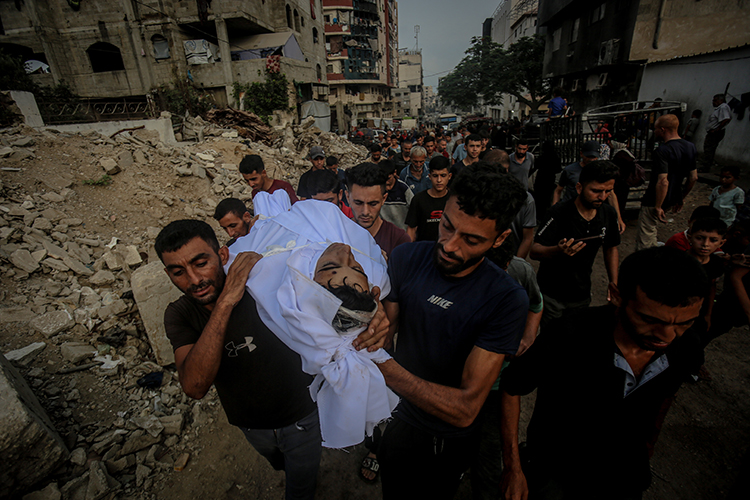
Five More People Die of Starvation in Gaza Amid Israeli Blockade
Five More People Die of Starvation in Gaza Amid Israeli Blockade
In the past 24 hours, five more Palestinians have died of starvation in the Gaza Strip, where famine is being imposed due to Israeli attacks and blockade. This brings the total number of starvation-related deaths to 227.
Munir al-Bursh, Director General of the Ministry of Health in Gaza, shared information about the deaths on X. He emphasized that the blockade and Israeli attacks continue to claim lives in Gaza, noting that two of the five recent deaths were children.
Nine Killed in Israeli Attacks Targeting Civilians Awaiting Aid
According to hospital sources and eyewitnesses, Israel targeted the tents of displaced persons, civilian homes, and those awaiting humanitarian aid. In Zaytun neighborhood in southeast Gaza, an Israeli strike hit a home, killing four and injuring two. Another home in the same neighborhood was also targeted, resulting in four more deaths.
Israeli forces targeted a home in the Sahabe area of Gaza City and another near the Sheikh Ridwan reservoir, killing seven Palestinians. In southern Gaza, an airstrike on a home claimed one life.
Israeli vehicles shelled the roof of a home in the “Belahiye” area of Shatii Refugee Camp in western Gaza City. Near Gaza Valley distribution points in central Gaza, Israeli forces fired on Palestinians awaiting aid, killing one child and injuring eleven.
In southern Gaza’s Mevasi area, an airstrike on a tent sheltering displaced persons killed five, including a married couple and two children.
Aid Recipients Targeted
Israeli forces fired at Palestinians awaiting aid near the Netzarim Corridor in central Gaza, killing four. In addition, four more were killed near a distribution center in southern Khan Yunus. Near Gaza Valley distribution points, Israeli attacks on aid recipients killed one child and injured eleven.
EU Commissioner: Gaza on the Brink of Famine
Hadja Lahbib, European Commissioner for Equality, Preparedness, and Crisis Management, warned on social media that Gaza is on the brink of famine. She highlighted that aid is being blocked, aerial deliveries are ineffective, and new NGO registration rules risk worsening the crisis. Lahbib added, “A full-scale Israeli strike would be catastrophic. There is a risk of mass casualties, collapsing services, and hostages. We call for a ceasefire, the release of hostages, and unhindered humanitarian access.”
WHO: Malnutrition Continues to Claim Lives in Gaza
Rik Peeperkorn, WHO Representative to Palestine, spoke at a weekly UN Geneva press briefing, noting that the overall health situation in Gaza remains catastrophic. Only 50% of hospitals and 38% of health centers are partially functional, with critical shortages of medicine and supplies.
Since May 27, 1,655 people attempting to access food have died, and over 11,800 have been injured. Peeperkorn stated that as of August 5, 2025, 148 people have died due to malnutrition, including 98 adults, 49 children, and 39 under five years old.
Peeperkorn criticized the restrictions preventing international health teams from reaching Gaza, warning that limiting access to healthcare will lead to more deaths.
7,522 Medical Evacuations Since October 2023
Since March 18, the denial of entry for healthcare personnel has increased by nearly 50%, including 102 critical international medical staff such as surgeons and other specialists. “Since October 2023, a total of 7,522 patients have been evacuated,” Peeperkorn said, urging more countries to accept patients from Gaza.
Gaza “Dying of Hunger”
Under Israel’s attacks and strict blockade, Gaza faces a humanitarian catastrophe with widespread hunger and shortages of water, medicine, medical supplies, and hygiene materials. Children are especially affected.
Israel’s military operations have destroyed 88% of Gaza’s civilian infrastructure. Repeated displacement has affected up to 2 million people, many of whom have been forced to move multiple times. Displaced Palestinians live in overcrowded shelters or makeshift tents, with inadequate sanitation and limited access to water, increasing the risk of infectious diseases.
Israeli forces continue daily strikes on civilian shelters and displaced persons’ sites, exacerbating the humanitarian crisis. Local and international observers accuse Israel of using hunger and deprivation as a weapon of war.